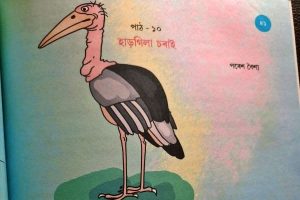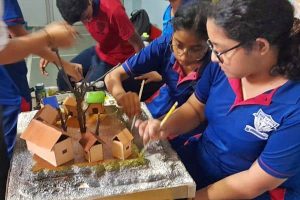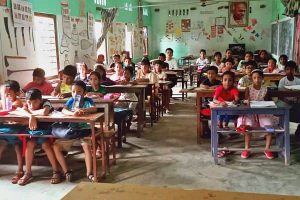Hargila Army – women saving the Greater Adjutant Stork
20,000
ha being restored
40,000
ha being restored
5,000
ha being restored
87,000
ha being restored
Project Summary
- Biodiversity
- ·
- Education
- ·
- Forest restoration
- ·
- Reforestation
- ·
- Regenerative agriculture
- ·
- Wetland restoration

Challenge
The Greater Adjutant stork is an endangered bird according to IUCN red list and is found in India and Cambodia. This IUCN red lists endangered birds with a decreasing global population trend of about 1200 individuals. Assam, India, is the stronghold of this bird, with about 80% of its global population is residing here.
The scavenging bird is locally called Hargila (bone swallower), treated as a bad omen, ugly pest, and disease carrier. This bird was persecuted poisoned, and its breeding colonies were destroyed. Purnima’s tireless and consistent works have reversed the situation of this bird of the people, and these needs to sustain.
Activities
Species And Habitat Restoration
Purnima and her Hargila Army are restoring the stork’s population through protecting nesting trees, providing artificial nesting trees, rescuing chicks that fall from the nest, and rehabilitating injured birds. Trees will be planted on 500 hectares of degraded land in unprotected areas near storks’ habitats. It really takes a village to protect these storks.
Community Development
The project has established a weaving center where local women weave traditional cloth with the stork motif, and make other products to sell as handicrafts. Materials for weaving and sewing and training in handicrafts is provided at the centre. Agroforestry farms will be established, including a training programme for women.
Education
The project recently opened a Hargila Education and Conservation Centre in Guwahati, Assam to share information about this amazing bird. Hargila baby showers and other cultural and ritual awareness events have attracted people and transformed the birds into cultural icons.
Rescue & Research
A nest adoption and learning exchange program among nest tree owners will be established. Radio tagging of 20 birds to learn more about their dispersal and other ecological information is planned. A bird hospital will be established.
Long-term Impact
Long-Term Impact
The long-term impact of these efforts will be transformative, ensuring the survival of the greater adjutant stork while strengthening community resilience and environmental stewardship. By restoring nesting sites and rehabilitating degraded habitats, the project will provide a sustainable sanctuary for storks and other wildlife, contributing to broader biodiversity conservation.
The engagement of local communities, particularly women, in conservation-linked livelihoods like weaving and agroforestry will create economic incentives for habitat protection, fostering a lasting sense of ownership and responsibility. Education initiatives will instill conservation values in future generations, turning the stork into a symbol of pride and ecological awareness.
Additionally, ongoing research and rescue programs, including radio tagging and the establishment of a bird hospital, will enhance scientific understanding of the species, guiding future conservation strategies. Together, these efforts will not only secure a future for the greater adjutant stork but also promote a holistic model of community-driven conservation that can be replicated across other regions.
Project Partners



Project Gallery







